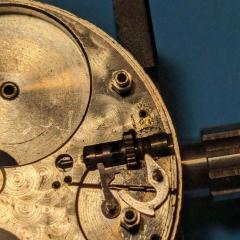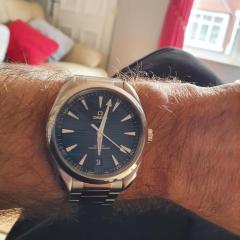-
Recently Browsing
- No registered users viewing this page.
-
Topics
-
Posts
-
Just to add to what @Neverenoughwatches says, the impulse jewel on the balance wheel is also held in by shellac, so avoid exposing the assembly to IPA as well - as stated the one-dip and generic tetrachloroethylene equivalent is safe with shellac so you can use this for your pallet fork and balance assembly. I agree, but worth noting that IPA readily soaks up water, even from the atmosphere: "IPA exposed to the air will absorb moisture rapidly until it reaches an equilibrium value of 65% IPA to 35% water." So you need to refresh it regularly.
-
By Neverenoughwatches · Posted
The width is otherwise known as mainspring height and strength as thickness for us more modern guys. -
By RichardHarris123 · Posted
I've remembered something I had forgotten. I've come across Dennison before but forgot all about it as I'm never going to use the units. Maybe we should start a thread on obscure units of measurement. -
Learned a new thing today! 🤓 Looked this up and found this informative document: Watkins-MainspringGauges.pdf
-
By Neverenoughwatches · Posted
Correct one dip is expensive when the chemical is purchased as " one dip " which is why it is mostly reserved for these two small parts as far as information tells us it is mostly tetrachloroethylene. I use it bought as perchloroethyl used in dry cleaning processes, i cant say I'm overimpressed with it though it appears to me to be shellac safe. What may be a better solution for hairsprings is a high lab grade of pure benzine. IPA is mostly used as a rinse and water displacer and yes it does have the potential to dissolve shellac, personally i would not buy anything that has significant water dilution so 99.9% IPA is the way to go. And lastly the part you are cleaning dictates your choice of cleaning brush, delicate parts like a hairspring requires the finest artist's brush you can find. Plates and bridges can take a little more scrubbing, but always check to make sure the surface is being unharmed. And dont forget a stick of tip benzine soaked correctly shaped pegwood is your mate set up for cleaning dirty jewels and removing stubborn dried up lubrication.
-






Recommended Posts